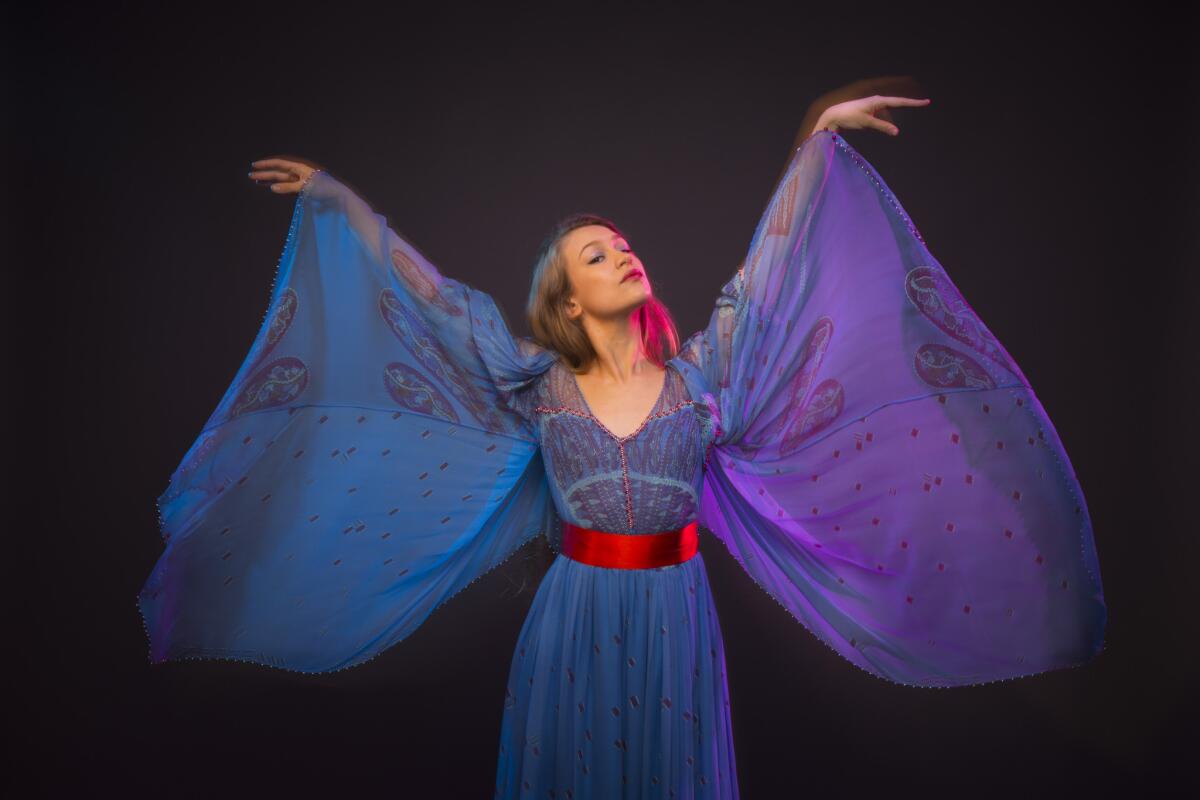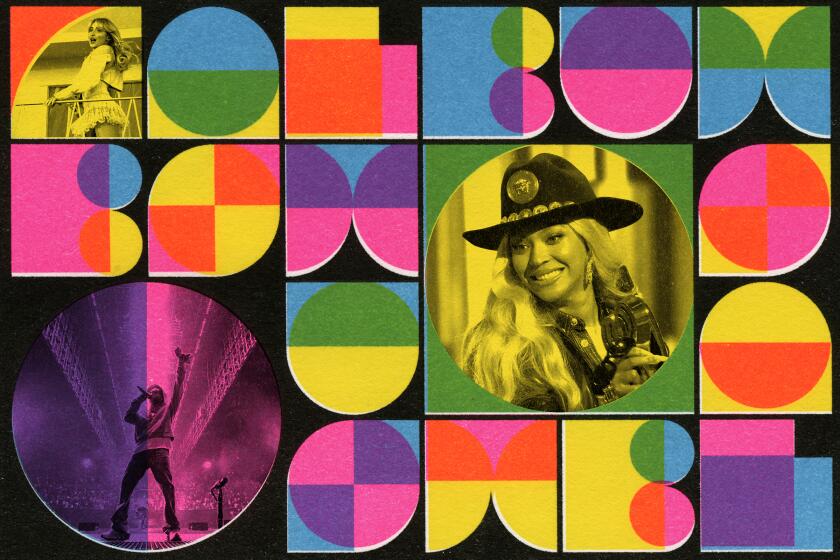Q&A: Joanna Newsom calls Spotify ‘a villainous cabal’ and ‘a garbage system’

Harpist and singer-songwriter Joanna Newsom is photographed in promotion of her new album, “Divers.”
Joanna Newsom is not a fan of Spotify, or bananas.
During a recent conversation with the composer, harp player and singer about her forthcoming album, “Divers,” she compared the two after admitting she has a severe aversion to the fruit.
“I’ve walked out of grocery stores because I can tell that there’s a banana over-ripening that’s fallen under the produce bins,” she said. “It’s been there for a few days -- it’s brown and gives off this gas. I can smell it walking in the door.”
Later she was asked about new music technology and replied with an analogy. “Spotify is the banana of the music industry,” she said, sitting at a patio table at a restaurant in the shadow of Scientology’s massive East Hollywood campus. “It just gives off a fume. You can just smell that something’s wrong with it.”
On the eve of Newsom’s forthcoming (Oct. 23) fourth album, she took time out to discuss her new work — and the shifting nature of music consumption.
You don’t offer your albums to the major streaming services. Why not?
I don’t do Spotify. I’m on Pandora. Does that count as streaming?
Kinda. You can’t deliberately call up your songs or albums at will, though. Your songs mix in with whatever the algorithm dictates.
My problem with Spotify is that, obviously the music industry is changing, and I accept that. And the way in which we’ve monetized the creation and consumption of music in the past is also changing. And I accept that too. I don’t love it, but I accept it. But in a way, that phenomenon is sort of a large, zoomed-out way of looking at everything at once. There’s a lot of moving parts. There’s a lot of things that are shifting. It’s cultural. There’s not really a villain.
Is your concern specific to Spotify?
Even with Pandora, you make – I don’t make a lot of money on that, or just record sales in general. But I understand the mechanics of it. My label and I have a particular licensing split, and we each receive our apportioned percentage of whatever the penny that Pandora sends us. I’d love to be making a better income, but it makes a kind of sense. There’s not really a bad guy.
Spotify is different?
Spotify is like a villainous cabal of major labels. The business is built from the ground up as a way to circumvent the idea of paying their artists. The major labels were not particularly happy with the fact that as the royalty money dwindled more and more, their portion of the percentage split agreed upon in their licensing agreement got smaller and smaller.
So someone came up with a great idea that if they start a streaming company, they can make those percentages even smaller. Infinitesimal, because they can make their money from advertising and subscription, and they don’t have to pay their artists anything for that. So it’s set up in a way that they can just rob their artists, and most of their artists have no way to fight it because they’re contractually obligated to stay with the label for x amount of time and you can’t really opt out. It’s a garbage system.
From a music listener’s perspective – and I’m a supporter of artists more than anything – there’s something amazing about it, though.
I agree. It’s a genius idea.
If you were to tell me as a kid that I would have the world’s jukebox – with a few notable exceptions, of course – at my fingertips, I wouldn’t have believed you.
If it wasn’t such a cynical and musician-hating system, I would be all for it. If there was some way they could divide the money they make from advertising and the money they make from subscriptions and actually give it to artists, I would have a completely different opinion about it.
Does that opinion carry over to other such services?
I mean, for all of its what seem to be many flaws that the Tidal system – I shouldn’t say “many flaws” because I haven’t researched Tidal enough. But I know it was kind of roundly made fun of because of the way in which it was unveiled to the world, but from what I gather they were trying to address the issues that make Spotify so very evil. I don’t know if they successfully did it. I should look into it. I understand why Spotify is great. I wish there was a way to provide the service they provide and have nobody lose, nobody be victimized by that.
Jonathan Prince, Spotify’s global head of communications and public policy, has replied to Newsom’s contentions with the following statement:
“We’d love to sit down with Joanna and try and clear up some of the misunderstandings about how Spotify works to support artists, songwriters, and the whole music industry. For example, someone has led her to believe ‘we don’t pay artists anything’ for advertising and subscriptions - in fact, we pay around 70 percent of all our revenue, from every single advertising and subscription dollar, in royalties. We’re proud that we’re the single biggest driver of growth in music right now, and we’d love to talk with Joanna about how we’re making streaming work for artists and songwriters around the world, cause we’d love to work with her too.”
Read the profile of Newsom based on the full conversation here; it will also appear on the cover of Sunday’s Arts & Books section.
This conversation has been edited for length and clarity.
Follow me on Twitter: @liledit
ALSO:
Taylor Swift leads 2015 AMA nominees (and will probably win them all)
Five videos that prove Los Lobos has earned a Rock and Roll Hall of Fame nod
‘Magical space cat’ Lil Bub has a new album and Andrew W.K. is psyched
More to Read
The biggest entertainment stories
Get our big stories about Hollywood, film, television, music, arts, culture and more right in your inbox as soon as they publish.
You may occasionally receive promotional content from the Los Angeles Times.










